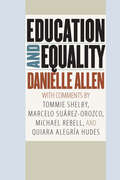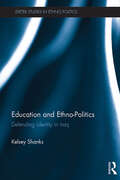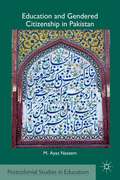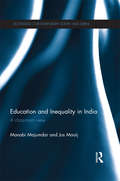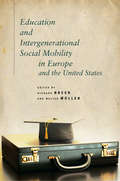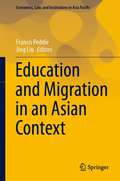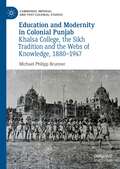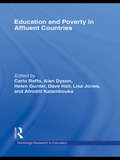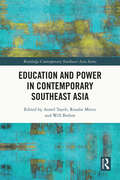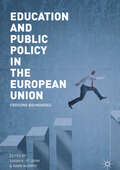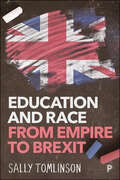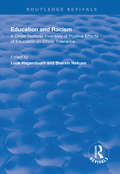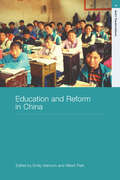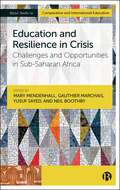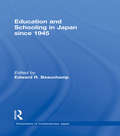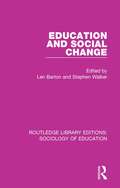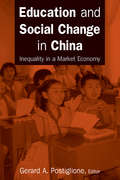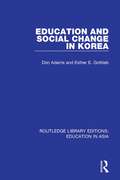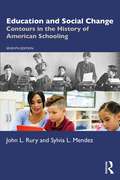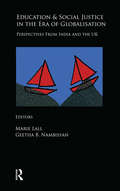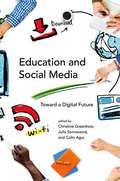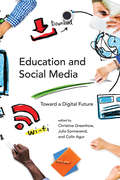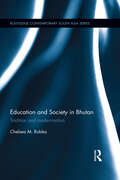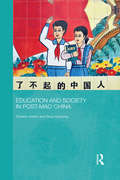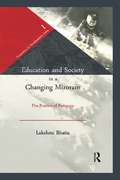- Table View
- List View
Education and Equality
by Danielle AllenAmerican education as we know it today--guaranteed by the state to serve every child in the country--is still less than a hundred years old. It's no wonder we haven't agreed yet as to exactly what role education should play in our society. In these Tanner Lectures, Danielle Allen brings us much closer, examining the ideological impasse between vocational and humanistic approaches that has plagued educational discourse, offering a compelling proposal to finally resolve the dispute. Allen argues that education plays a crucial role in the cultivation of political and social equality and economic fairness, but that we have lost sight of exactly what that role is and should be. Drawing on thinkers such as John Rawls and Hannah Arendt, she sketches out a humanistic baseline that re-links education to equality, showing how doing so can help us reframe policy questions. From there, she turns to civic education, showing that we must reorient education's trajectory toward readying students for lives as democratic citizens. Deepened by commentaries from leading thinkers Tommie Shelby, Marcelo Suárez-Orozco, Michael Rebell, and Quiara Alegría Hudes that touch on issues ranging from globalization to law to linguistic empowerment, this book offers a critical clarification of just how important education is to democratic life, as well as a stirring defense of the humanities.
Education and Ethno-Politics: Defending Identity in Iraq (Exeter Studies in Ethno Politics)
by Kelsey ShanksThe Iraqi Disputed Territories consist of 15 districts stretching across four northern governorates. While an administrative solution for the disputed territories remains evasive, minority groups across the region have been pulled into a clash over demographic composition as each disputed district faces ethnically defined claims. Meanwhile, inter-ethnic communal tensions are rising and questions of identity increasingly overshadow day-to-day life. There has been little research on the impact of heightened identity politics on the everyday lives of citizens. Regardless of the final administrative outcome, the multi-ethnic population of the region requires services and systems of co-existence, and in the fragile ethno-political environment of the disputed territories, the way in which the education system manages ethnic diversity is crucial. It is within this context that Education and Ethno-Politics examines the development of education systems across the region post 2003. Drawing on over 50 interviews with regional education officials and community representatives, the book presents the impact of amplified ethno-politics on the reconstruction of education in Iraq. It provides the first academic exploration into education in the region, exploring the significance of cultural reproduction and the link between demands for ethnically specific education, societal security and the wider political contestation over the territory. A comprehensive analysis of the powerful role of education in identity-based conflicts, this book offers a highly insightful examination of Iraq's past and present, as well as formulating policy recommendations for its future. It is an essential resource for students, scholars and policy makers with focus on the Middle East, specifically Iraqi and Kurdish studies, as well as those interested in Education policy and Conflict studies.
Education and Gendered Citizenship in Pakistan
by M. Ayaz NaseemThis book challenges the uncritical use of the long held dictum of the development discourse that education empowers women. Situated in the post-structuralist feminist position it argues that in its current state the educational discourse in Pakistan actually disempowers women.
Education and Inequality in India: A Classroom View (Routledge Contemporary South Asia Series)
by Manabi Majumdar Jos MooijUniversalization of primary education has been high on the policy agenda in India. This book looks at the reproduction of social inequalities within the educational system in India, and how this is contested in different ways. It examines whether the concept of `education for all’ is just a mechanically conceived policy target to chasing enrolment and attendance or whether it is a larger social goal and a deeper political statement about the need for attacking entrenched social inequalities. Drawing on original data collected in the two states of Andhra Pradesh and West Bengal, the authors present the multiple ways in which social class impinges on the educational system, educational processes and educational outcomes. The book goes on to explore issues around autonomy and accountability via an analysis of the position of teachers within the educational hierarchy, and by looking at the various possibilities of making teachers accountable. Recommendations related to the necessity for a larger debate and normative framework are made, including whether private schools should play a role, and whether it is necessary to move from government action and responsibilities to a broader concept of public action. The book presents in interesting contribution for students and scholars of South Asian studies, as well as Education and Public Policy studies.
Education and Intergenerational Social Mobility in Europe and the United States (Studies in Social Inequality)
by Walter Müller Richard BreenThis volume examines the role of education in shaping rates and patterns of intergenerational social mobility among men and women during the twentieth century. Focusing on the relationship between a person's social class and the social class of his or her parents, each chapter looks at a different country—the United States, Sweden, Germany, France, the Netherlands, Italy, Spain, and Switzerland. Contributors examine change in absolute and relative mobility and in education across birth cohorts born between the first decade of the twentieth century and the early 1970s. They find a striking similarity in trends across all countries, and in particular a contrast between the fortunes of people born before the 1950s, those who enjoyed increasing rates of upward mobility and a decline in the strength of the link between class origins and destinations, and later generations who experienced more downward mobility and little change in how origins and destinations are linked. This volume uncovers the factors that drove these shifts, revealing education as significant in promoting social openness. It will be an invaluable source for anyone who wants to understand the evolution of mobility and inequality in the contemporary world.
Education and Migration in an Asian Context (Economics, Law, and Institutions in Asia Pacific)
by Jing Liu Francis PeddieThis edited book explores the complex and multifaceted connections between education and migration in an Asian context from multiple perspectives. It features studies from China, Japan, India, the Philippines, Thailand, and Timor-Leste and covers diverse migration and education experiences. These experiences encompass internal and international migration and forced displacement, as well as questions surrounding education such as school choice, education provision and training as human capital; education and social inclusion; and student performance in a post-conflict context. By covering a wide range of questions and situations, the original scholarship in this book reveals how human development concerns and higher rates of movement within and outside of Asian countries operate on multiple levels in a globalized world.
Education and Modernity in Colonial Punjab: Khalsa College, the Sikh Tradition and the Webs of Knowledge, 1880-1947 (Cambridge Imperial and Post-Colonial Studies)
by Michael Philipp BrunnerThis book explores the localisation of modernity in late colonial India. As a case study, it focuses on the hitherto untold colonial history of Khalsa College, Amritsar, a pioneering and highly influential educational institution founded in the British Indian province of Punjab in 1892 by the religious minority community of the Sikhs. Addressing topics such as politics, religion, rural development, militarism or physical education, the study shows how Sikh educationalists and activists made use of and ‘localised’ communal, imperial, national and transnational discourses and knowledge. Their modernist visions and schemes transcended both imperialist and mainstream nationalist frameworks and networks. In its quest to educate the modern Sikh – scientific, practical, disciplined and physically fit – the college navigated between very local and global claims, opportunities and contingencies, mirroring modernity’s ambivalent simultaneity of universalism and particularism.
Education and Poverty in Affluent Countries (Routledge Research in Education)
by Dave Hall Lisa Jones Carlo Raffo Alan Dyson Helen Gunter Afroditi KalamboukaFor the first time, researchers, policymakers and practitioners across the world will have access to a comprehensive mapping of research evidence and policy strategies about education and poverty in affluent countries. Although there is widespread agreement that poverty and poor educational outcomes are related, there are competing explanations as to why that should be the case. This is a major problem for practitioners, policy makers and researchers who are looking for pointers to action, or straightforward ways of understanding an issue that troubles education systems across the world. This unique book brings scholarship and analysis from some of the most influential researchers and writers on education and poverty within one text. The authors provide a synthesising framework that will help researchers and policy makers to examine future educational policy in a holistic and comprehensive fashion.
Education and Power in Contemporary Southeast Asia (Routledge Contemporary Southeast Asia Series)
by Rosalie Metro Will Brehm Azmil TayebThis book focuses on education and power in Southeast Asia and analyzes the ways in which education has been instrumentalized by state, non-state, and private actors across this diverse region. The book looks at how countries in Southeast Asia respond to the endogenous and exogenous influences in shaping their education systems. Chapters observe and study the interplay between education and power in Southeast Asia, which offers varying political, social, cultural, religious, and economic diversities. The political systems in Southeast Asia range from near consolidated democracy in Indonesia to illiberal democracy in Singapore and Thailand to the communist regime in Laos to absolute monarchy in Brunei. Structured in three parts, (i) centralization and decentralization, (ii) privatization and marketization, and (iii) equity and justice, these themes are discussed in single-country and/or multi-country studies in the Southeast Asian region. Bringing together scholars from and focused on Southeast Asia, this book fills a gap in the literature on education in Southeast Asia.
Education and Public Policy in the European Union: Crossing Boundaries
by Mark Murphy Sarah K. St. JohnThis book fleshes out activities and initiatives in the field of education from across areas of European Union competence in order to highlight the extent to which education and training have penetrated the European Community’s policymaking since its creation. Policies are all too often placed in their individual silos, which can sometimes work against deeper understanding of policymaking and its reach across policy domains. This project avoids such compartmentalisation and instead crosses boundaries to explore education’s relationship with other policy areas, as well as its far-reaching role in the construction of a united Europe. It demonstrates education’s significance across the broad landscape of European integration by presenting a collection of case studies, which represent policy areas that have experienced the infiltration of education. These include: Migration, Health, Agriculture, Multilingualism, Media and Communications, and the environment.
Education and Race from Empire to Brexit
by Sally TomlinsonCovering the period from the height of Empire to Brexit and beyond, this book shows how the vote to leave the European Union increased hostilities towards racial and ethnic minorities and migrants. Concentrating on the education system, it asks whether populist views that there should be a British identity - or a Scottish, Irish or Welsh one - will prevail. Alternatively arguments based on equality, human rights and economic needs may prove more powerful. It covers events in politics and education that have left most white British people ignorant of the Empire, the often brutal de-colonisation and the arrival of immigrants from post-colonial and European countries. It discusses politics and practices in education, race, religion and migration that have left schools and universities failing to engage with a multiracial and multicultural society.
Education and Racism: A Cross National Inventory of Positive Effects of Education on Ethnic Tolerance (Routledge Revivals)
by Louk Hagendoorn Shervin NekueeFirst published in 1999, this book gives an inventory of factors contributing to ethnic prejudice in seven countries and the role of formal education among them on the basis of national surveys. It appears that education is crucial in all the countries surveyed and contributes to more tolerant views of ethnic and national minorities in Western European countries, Poland and the United States. The positive effects of education, however, do not always counter the negative effects of personality characteristics and conservative values on ethnic prejudice. Moreover, the negative effects of less formal education may be reinforced by perceived economical competition of ethnic minorities and thereby further bolster prejudiced views of the less educated. This indicates that formal education alone is not sufficient to change prejudiced views. Other forms of socialization transmitting values leading to open-mindedness and the ability to secure one's economic position have to support the positive effects of formal education as well.
Education and Reform in China (Routledge Studies in Asia's Transformations)
by Emily Hannum Albert ParkTransformative market reforms in China since the late 1970s have improved living standards dramatically, but have also led to unprecedented economic inequality. During this period, China’s educational system was restructured to support economic development, with educational reforms occurring at a startling pace. Today, the educational system has diversified in structure, finance, and content; it has become more market-oriented; and it is serving an increasingly diverse student population. These changes carry significant consequences for China’s social mobility and inequality, and future economic prospects. In Education and Reform in China, leading scholars in the fields of education, sociology, demography, and economics investigate the evolution of educational access and attainment, educational quality, and the economic consequences of being educated. Education and Reform in China shows that economic advancement is increasingly tied to education in China, even as educational services are increasingly marketized. The volume investigates the varying impact of change for different social, ethnic, economic and geographic groups. Offering interdisciplinary views on the changing role of education in Chinese society, and on China’s educational achievements and policy challenges, this book will be an important resource for those interested in education, public policy, and development issues in China.
Education and Resilience in Crisis: Challenges and Opportunities in Sub-Saharan Africa (Bristol Studies in Comparative and International Education)
by Sweta Gupta Danielle Falk Daniel Shephard Cyril Brandt Dieudonné Kanyerhera Diego De la Fuente Stevens Samuel Matabishi Abby Mills Ygal Sharon Shukrani Salvatory Ashika Sharma Abdi Bihi Hanaf Muktar Hersi Mohamed Bang Chuol Aditi DesaiThis book provides an important lens for understanding how interlocking humanitarian crises caused by armed conflict, natural disasters, forced displacement and, more recently, a global health pandemic have adversely impacted teaching and learning. It brings together evidence from multiple, diverse research-practice partnerships in seven countries: the Democratic Republic of the Congo, Ethiopia, Niger, Somalia, South Sudan, Tanzania and Uganda. The authors provide a clear account of the key academic, policy and practice questions on education in crisis contexts and consider our capacity to develop just and resilient education systems.
Education and Schooling in Japan since 1945 (Dimensions of Contemporary Japan #Vol. 3)
by Edward R. BeauchampFirst Published in 1999. Routledge is an imprint of Taylor & Francis, an informa company.
Education and Social Change (Routledge Library Editions: Sociology of Education #4)
by Stephen Walker Len BartonThis book, first published in 1985, argues that changes in the education system are closely bound up with wider social and political changes. It considers items within education such as developments in teacher assessment policy and changes in the control of education policy; and external items such as new directions in the management of the economy, of class relations and of the political system. Throughout, the book reflects a mood of growing frustration and anxiety shared by many teachers and educationalists which, the book argues, stems from a feeling that the education system is not being run as it should be. This title will be of interest to students of education and sociology.
Education and Social Change in China: Inequality in a Market Economy
by Gerard A. PostiglioneMarket reform, financial decentralization, and economic globalization have greatly accentuated China's social and regional inequalities. Education is expected to address these inequalities in a context of rapid social change, including the rise of an urban middle class, changed status of women, resurgence of ethnic identities, growing rural to urban migration, and lingering poverty in remote areas. But some argue that state policies have not sufficiently addressed inequitable practices, and that schools actually perpetuate and reproduce inequities, giving rise to a new system of social stratification driven more by market forces than socialist principles. Featuring all original, previously unpublished material, this volume examines this argument through analysis of selected aspects of educational stratification in China during the reform era. Chapters focus on the new urban middle class, poor rural residents, the migrant population in urban areas, rural girls, and ethnic minorities. The contributors are established scholars in the field, and they build a conceptual framework for assessing the degree to which China's educational reforms are inclusive, equitable, and integrative across social categories and groups.
Education and Social Change in Korea (Routledge Library Editions: Education in Asia #7)
by Don Adams Esther E. GottliebThis book, first published in 1993, provides students and scholars with an introduction to Korean education and the dynamics of interchange between the educational system and rapidly changing Korean society. Severe political, social and educational problems may be found in modern Korea: these conditions, together with certain persistent issues pertaining to the purposes, structure, and pedagogical characteristics of schooling make for serious contemporary debate.
Education and Social Change: Contours in the History of American Schooling
by John L. Rury Sylvia L. MendezThis concise, interpretive history of American schooling focuses on the evolving relationship between education and social change.Like its predecessors, this fully updated new edition investigates the impact of social forces such as industrialization, urbanization, immigration, globalization, and cultural conflict on the development of schools and other educational institutions. It also examines the various ways that schools have contributed to social change, particularly in enhancing the status and accomplishments of certain social groups and not others. Detailed accounts of the experiences of women and minority groups in American history consider how their lives have been affected by education at key points in the past.Updates to the seventh edition include: Enhanced coverage for understanding the experiences of Native Americans, students in poverty settings, and the LGBTQ+ community in the midst of social change. New topics include settler colonialism, indigeneity, culturally diverse education, gay and transgender educational policies, charter schools, voucher programs, and the rise of testing in schools. It has been edited throughout to update information and sources regarding the history of American education and related processes of social transformation in the nation’s past.This bestselling introductory text is essential reading for Educational Foundations, History of Education, and Schools and Society, and similar courses for pre-service teachers, educational leaders, and others.New online material includes discussion questions and links to further reading and resources, available at www.routledge.com/9781032745947
Education and Social Justice in the Era of Globalisation: Perspectives from India and the UK
by Marie Lall; Geetha B. NambissanThe book discusses the implications of globalization on education from the perspective of social justice. It looks at two countries — India and the UK — to look at how global economic and cultural processes are mediated through nation states, institutional structures and the aspirations of different social groups. It seeks to resituate the debates around education and social justice in policy, research and public discourse by highlighting the need for a more nuanced understanding of globalization and education. It also demonstrates the effects of economic dimensions — the politics of neoliberalism, and how this has shifted the understanding of state responsibilities and marginalized issues pertaining to the agenda of social justice.
Education and Social Media: Toward a Digital Future
by Colin Agur Christine Greenhow Julia SonnevendHow are widely popular social media such as Facebook, Twitter, and Instagram transforming how teachers teach, how kids learn, and the very foundations of education? What controversies surround the integration of social media in students' lives? The past decade has brought increased access to new media, and with this new opportunities and challenges for education. In this book, leading scholars from education, law, communications, sociology, and cultural studies explore the digital transformation now taking place in a variety of educational contexts. The contributors examine such topics as social media usage in schools, online youth communities, and distance learning in developing countries; the disruption of existing educational models of how knowledge is created and shared; privacy; accreditation; and the tension between the new ease of sharing and copyright laws. Case studies examine teaching media in K--12 schools and at universities; tuition-free, open education powered by social media, as practiced by the University of the People; new financial models for higher education; the benefits and challenges of MOOCS (Massive Open Online Courses); social media and teacher education; and the civic and individual advantages of teens' participatory play.ContributorsColin Agur, Jack M. Balkin, Valerie Belair-Gagnon, danah boyd, Nicholas Bramble, David Buckingham, Chris Dede, Benjamin Gleason, Christine Greenhow, Daniel J. H. Greenwood, Jiahang Li, Yite John Lu, Minhtuyen Mai, John Palfrey, Ri Pierce-Grove, Adam Poppe, Shai Reshef, Julia Sonnevend, Mark Warschauer
Education and Social Media: Toward a Digital Future (The John D. and Catherine T. MacArthur Foundation Series on Digital Media and Learning)
by Colin Agur Christine Greenhow Julia SonnevendLeading scholars from a variety of disciplines explore the future of education, including social media usage, new norms of knowledge, privacy, copyright, and MOOCs.How are widely popular social media such as Facebook, Twitter, and Instagram transforming how teachers teach, how kids learn, and the very foundations of education? What controversies surround the integration of social media in students' lives? The past decade has brought increased access to new media, and with this new opportunities and challenges for education. In this book, leading scholars from education, law, communications, sociology, and cultural studies explore the digital transformation now taking place in a variety of educational contexts. The contributors examine such topics as social media usage in schools, online youth communities, and distance learning in developing countries; the disruption of existing educational models of how knowledge is created and shared; privacy; accreditation; and the tension between the new ease of sharing and copyright laws. Case studies examine teaching media in K–12 schools and at universities; tuition-free, open education powered by social media, as practiced by the University of the People; new financial models for higher education; the benefits and challenges of MOOCS (Massive Open Online Courses); social media and teacher education; and the civic and individual advantages of teens' participatory play.ContributorsColin Agur, Jack M. Balkin, Valerie Belair-Gagnon, danah boyd, Nicholas Bramble, David Buckingham, Chris Dede, Benjamin Gleason, Christine Greenhow, Daniel J. H. Greenwood, Jiahang Li, Yite John Lu, Minhtuyen Mai, John Palfrey, Ri Pierce-Grove, Adam Poppe, Shai Reshef, Julia Sonnevend, Mark Warschauer
Education and Society in Bhutan: Tradition and modernisation (Routledge Contemporary South Asia Series)
by Chelsea M. RoblesBhutan's education sector has attracted international attention for recent reforms driven by the national development philosophy of Gross National Happiness, which aspires to balance change with the continuity of tradition. This book traces the history of education in Bhutan and reveals that, as the country has modernised and become globally connected and further influenced by international and Western mores, tensions have emerged across the education sector. The author examines how these tensions between the curriculum and local knowledges can impact teaching and learning, and offers approaches to addressing them. Based on extensive empirical data, including in-depth interviews and classroom observations, Robles analyzes the discourses of high-level officials who were involved in the early development of the modern system of education, a range of education leaders, and teachers. Filling a gap in the literature, this book is an invaluable resource for students and researchers interested in the formation of education policy, social and political reform in Bhutan, and South Asia Studies.
Education and Society in Post-Mao China (Routledge Studies in Education and Society in Asia)
by Edward Vickers Zeng XiaodongThe post-Mao period has witnessed rapid social and economic transformation in all walks of Chinese life – much of it fuelled by, or reflected in, changes to the country’s education system. This book analyses the development of that system since the abandonment of radical Maoism and the inauguration of ‘Reform and Opening’ in the late 1970s. The principal focus is on formal education in schools and conventional institutions of tertiary education, but there is also some discussion of preschools, vocational training, and learning in non-formal contexts. The book begins with a discussion of the historical and comparative context for evaluating China’s educational ‘achievements’, followed by an extensive discussion of the key transitions in education policymaking during the ‘Reform and Opening’ period. This informs the subsequent examination of changes affecting the different phases of education from preschool to tertiary level. There are also chapters dealing specifically with the financing and administration of schooling, curriculum development, the public examinations system, the teaching profession, the phenomenon of marketisation, and the ‘international dimension’ of Chinese education. The book concludes with an assessment of the social consequences of educational change in the post-Mao era and a critical discussion of the recent fashion in certain Western countries for hailing China as an educational model. The analysis is supported by a wealth of sources – primary and secondary, textual and statistical – and is informed by both authors’ wide-ranging experience of Chinese education. As the first monograph on China's educational development during the forty years of the post-Mao era, this book will be essential reading for all those seeking to understand the world’s largest education system. It will also be crucial reference for educational comparativists, and for scholars from various disciplinary backgrounds researching contemporary Chinese society.
Education and Society in a Changing Mizoram: The Practice of Pedagogy (Transition in Northeastern India)
by Lakshmi BhatiaLocated in the domain of cultural politics, the book with rich ethnographical data from Mizoram, a lesser known and understood state, brings the community, state and culture to centre-stage, along with family and stratification of the sociological discourse in education. The book argues for a re-look at school education in Mizoram, besides providing critical insights into the North East region as a whole. It also points to the dilemmas of development in that region and suggests possible ways out of the impasse. Marking a significant departure from conventional thinking on education as 'human capital' as reflected in North-East Vision: 2020, the book strongly advocates the need for critical pedagogies based on learning from conflict; inculcating the values of tolerance and compassion as a precursor to peace; reconceptualising `development, not merely as 'economic' but as indicator of national happiness and valuing lives equally besides respect for traditional institutions, thus marking a break from the much resented paternalism that underpins all state interventions in education. One of the first studies of its kind regarding experience and practice of education, the book makes an important contribution to the role that education can play to usher in peace and promote respect for differences.
